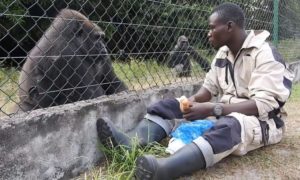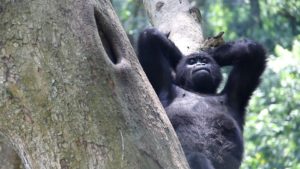Senkwekwe Centre and Gorilla Orphanage – A Visit to Senkwekwe, best time, Prices/Fees and other tour Activities
Senkwekwe Centre and Gorilla Orphanage is found within Virunga National Park’s Headquarters in Rumangabo and is so far the only mountain gorilla orphanage in the whole World. Given its location-adjacent to the luxurious Mikeno Lodge, it is very accessibly for visitors planning to trek gorillas in Congo and also learn about the riveting history of the Orphanage. The Orphan mountain gorillas here are victims of gruesome poaching and are currently cared for and offered protection by professional staff.
This magnificent Orphanage is an exceptional Sanctuary providing the orphaned mountain gorillas the second chance to life and security within the densely forested enclosure.
History of Senkwekwe Centre and Gorilla Orphanage
 After a long period of armed conflicts within Eastern Democratic Republic of Congo that also affected the popular Virunga National Park, Park Rangers re-gained control of the Protected Area in early 2009. Subsequently, the Rangers started sensitization and awareness programs, teaching locals on how to protect the two young mountain gorillas in their care and protection.
After a long period of armed conflicts within Eastern Democratic Republic of Congo that also affected the popular Virunga National Park, Park Rangers re-gained control of the Protected Area in early 2009. Subsequently, the Rangers started sensitization and awareness programs, teaching locals on how to protect the two young mountain gorillas in their care and protection.
This Gorilla Orphanage was named after a popular silverback gorilla that was murdered in 2007 alongside three other members of Rugendo Gorilla Group, within Virunga National Park leaving out some Orphans.
These orphaned mountain gorillas were known as Ndakasi and Ndeze, and their life was filled with mystery and sorrow following their untimely death of their mother. These gorillas were forced by unfortunate circumstances of conflict and war to get shelter within the small compound in the adjacent Goma City. The City is Goma was very different from their natural environment, given the heavy pollution, excess noise and heavy built-up Lava flow that destroyed significant verdant vegetation.
With the increased security in the southern sector of Virunga National Park, a team of conservationists, researchers and Rangers embarked on a mission to raise funds that would help in setting up a care facility within the Rumangabo Park Headquarters. The area that was designated for the project comprised of verdant forest in addition to wide range of wildlife species with total safety.
 Two more mountain gorillas-Koboko and Maisha later joined the Orphanage at the end of 2010. These were rescued from the neighboring Rwanda where they lived in a small enclosure. A total of four gorillas comfortably settled-in at Senkwekwe Centre and Gorilla Orphanage but the latter two gorillas later lost their lives to health complications. Besides the mountain gorillas, this Center also rehabilitates orphaned Eastern Lowland Gorillas rescued from poachers and animal traffickers.
Two more mountain gorillas-Koboko and Maisha later joined the Orphanage at the end of 2010. These were rescued from the neighboring Rwanda where they lived in a small enclosure. A total of four gorillas comfortably settled-in at Senkwekwe Centre and Gorilla Orphanage but the latter two gorillas later lost their lives to health complications. Besides the mountain gorillas, this Center also rehabilitates orphaned Eastern Lowland Gorillas rescued from poachers and animal traffickers.
The Great Apes at the Orphanage are closely monitored by Virunga Park Rangers, with over 6 gorillas calling the site home. Their typical day begins at 6:00am with breakfast before being released into the garden at about 7:00am to play, forage and interact with their environment. When still younger, they needed constant care but now that they are grown-up, they are left to go about their daily activity without strict monitoring and supervision from caretakers.
By 4:00pm they retire to their enclosures for overnight and involve enjoying the last meal at the bash of the playground. Their bedding/nests include a bunch of leaves-wild celery, built by Park Rangers. When still babies, these gorillas are first fed on milk foods and highly nutritious porridge before being finally introduced to natural vegetation, vegetables and fruits in their natural environment.
Best time to explore Senkwekwe Center and Gorilla Orphanage
Senkwekwe Center and Gorilla Orphanage can be explore throughout the year, at the same time of trekking mountain gorillas, hiking Mount Nyiragongo, birding and chimpanzee trekking within Virunga National Park. Even guests of Mikeno Lodge can always visit the Center as long as advance bookings are done. Most visitors prefer the dry season-June to September and December to February when vegetation of Virunga is not overgrown, trails are not muddy and slippery. However, these conditions can’t stop treks from going on as earlier planned.

